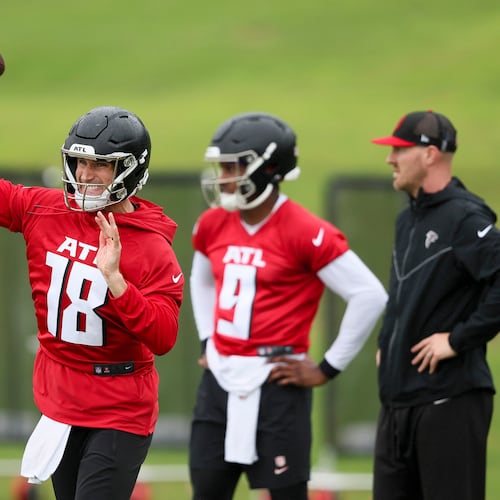A couple of days before the Falcons left for a 10-day trip, wide receiver Julio Jones said it would be the first time in his football-playing life he’s been on the road for so long.
The Falcons were in Baltimore for two days and then departed for a week in London to prepare to face the Lions on Sunday at Wembley Stadium. Professional baseball, basketball and hockey players routinely go on long trips for work, but NFL players are accustomed to in-and-out weekend trips.
Still, Jones brushed off the effects of the disruption.
“It’s part of my job,” Jones said. “I’ve got to go and get ready to work.”
It’s easy for NFL players to tolerate an overseas trip once every few years. But soon they may be asked to leave North America to play more often — and eventually the NFL wants to have a franchise in London.
The NFL is playing three regular-season games at Wembley Stadium this season, the most since it started international-series games there in 2007. The league played one game each season there from 2007 through 2013, when two games were held in London.
The Falcons’ Arthur Blank is the latest franchise owner willing to give up the competitive advantage of a home game and go to London. That suggests the financial incentives to play there are enticing for team owners, just as the opportunity to build the NFL’s brand internationally is advantageous for the league as a whole.
Attendance and TV ratings have been strong for the London games, so the NFL is looking to play more regular-season games there.
“There’s definitely a capacity to do more and definitely demand to do more,” said Mark Waller, NFL executive vice president international. “The issue becomes, from a U.S. perspective, how many home games do you move? Which teams are ready and willing to give up home games, and how to accommodate those games into an already complicated schedule?”
Currently, each NFL team that plays a game in London is guaranteed a bye the following week. The NFL schedule allows bye weeks from Weeks 4 to 12, which means London can host games only from Weeks 3 to 11.
Waller said Wembley can accommodate an expanded schedule of NFL games because its main tenant, the England national soccer team, plays only two or three matches there in the fall and winter.Waller said the bigger challenge is finding adequate training facilities for NFL teams, sometimes for an entire week.
“Trying to find places where they can train with accommodations nearby so they are not spending inordinate time on buses getting from hotel to training facilities,” Waller said. “The more games you play, the more complex that becomes to solve.”
So far, the trouble has been worth it for the NFL.
All but one of the previous nine London games had more than 80,000 fans in attendance (Waller said Wembley’s capacity for football is 84,000). Tickets sold out quickly for all three London games this season.
Football also has gained TV viewership among fans more partial to soccer, cricket, rugby and other sports. The NFL said football is the sixth-most watched sport on Britain’s Sky Sports subscription channel, and that last year’s audience of 13.8 million was up 60 percent from 2012.
It’s that kind of support that has NFL owners contemplating playing more games in London. Operating a franchise in England would present much steeper challenges even beyond whether the English will support one team that plays eight home games rather than several playing a few showcase games each season.
First, NFL owners would have to convince American-born players to agree to play there. Players would face long flights back to the U.S. and potential economic issues such as differing labor laws and tax codes.
A London franchise could create competitive concerns for the NFL because either the England team or the visitors would face a disadvantage with long flights and changes in time zones. Waller said the London team’s schedule could include alternating “blocks” of home and away games so the team is in London or the United States for weeks at a time.
In an interview with The Guardian this week, Blank said he thinks players would agree to a London franchise, and he believes potential issues such as scheduling and time difference can be worked out.
“The league has aspirations to continue to grow the number of games and to eventually have a franchise in London,” Blank told The Guardian. “We think that’s a possibility. It’s 6-7 years away, somewhere in that time frame. No one knows for sure, but we are certainly moving in that direction.”
About the Author
Keep Reading
The Latest
Featured

